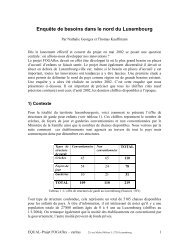Die Entwicklung integrierter familienunterstützender - Qualiflex.lu
Die Entwicklung integrierter familienunterstützender - Qualiflex.lu
Die Entwicklung integrierter familienunterstützender - Qualiflex.lu
Create successful ePaper yourself
Turn your PDF publications into a flip-book with our unique Google optimized e-Paper software.
France - 2. Overview of programmes and concepts<br />
welcome session for the new parents to address their concerns and answer<br />
questions. One common tool is the cahier d’élève or ‘student notebook’ that<br />
children carry between parents and teachers on a regular basis.<br />
2.2.3 Bridging Families, schools and communities<br />
An area is designated as a ‘Zone d’éducation prioritaire’ (ZEP) when it inc<strong>lu</strong>des<br />
a high proportion of children deemed to be socio-economically disadvantaged,<br />
according to a variety of criteria outlined by the Ministry of Education.<br />
Each ZEP is entitled to receive additional funding and resources from<br />
the state for its junior high schools and its elementary and nursery schools.<br />
These financial resources may be used, for example, to lower staff-child<br />
rations, hire social workers and other support staff, fund staff bonuses and<br />
invest in pedagogical materials. Usually, a ZEP is affiliated with a larger<br />
network of schools, known as REP.<br />
REP is a ‘Network of Priority Education’ (Réseau d’éducation prioritaire)<br />
that groups together schools serving disadvantaged populations within a<br />
broad geographical area, and provides them with technical support, pooled<br />
resources and opportunities to exchange innovative practices. Each network<br />
is directed by an education inspector and governed by a Council which defines<br />
and oversees the ‘contract for success’ of schools in the REP. ‘Contract<br />
for success’ outlines the pedagogical requirements of a ZEP within the<br />
framework of the national goals defined by the Ministry of Education.<br />
The REP-ZEP coordinator is an experienced teacher whose role is to<br />
help coordinate the objectives and activities within a zone and help decide<br />
how to allocate resources and work with local partners involved in ZEP.<br />
REP-ZEP coordinators are often actively involved in bridging the activities<br />
that meet objectives of both ZEP and the ‘politique de la ville’ (Urban and<br />
housing policies).<br />
Increasingly, priority education policy is linked to urban development<br />
policies. As part of the politique de la ville, mayors of big cities have signed<br />
seven-year contracts with the national government to improve the living<br />
conditions of families and foster social integration in disadvantaged urban<br />
areas. Mayors develop the objectives, budget, time frame, tailoring the contracts<br />
to local economic and social conditions. The politique de la ville encourages<br />
cities to develop their plans to coincide with the educational objectives<br />
of the ZEP’ “contracts for success”. In this context, schools are able to implement<br />
outreach programmes with parents and residents in their community<br />
with the additional resources from urban policy. A city, for instance, can use<br />
the grant to support a drop-in-child-care centre run by immigrant women in<br />
a public housing project.<br />
The schools in Zones d’éducation prioritaire are granted by the Ministry of<br />
Education the status of Pôle d’excellence scolaire when they form partnerships<br />
with cultural, educational and other local institutions. The aim is to support<br />
creative projects and field trips to visit partner institutions, such as museums.<br />
39



